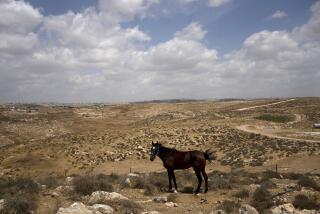Israelis press ahead with controversial housing project near Jerusalem
- Share via
JERUSALEM -- Defying a wave of international condemnation, Israel on Wednesday gave final approval to a 2,610-unit housing project in a southern Jerusalem area that Palestinians claim should be part of their future state.
The project, called Givat Hamatos, is the first entirely new development approved in 15 years in the Jerusalem area on land Israel seized during the 1967 Middle East War. City officials said the project -- which could begin construction in a year -- is needed to ease the rising cost of housing.
Palestinians say the development will further divide Arab neighborhoods of East Jerusalem from the West Bank. Officials from the Palestinian Authority threatened to take their complaints about the project to the U.N. Security Council.
The most recent new development built by the Israelis in the Jerusalem area was nearby Har Homa, which was approved in 1997 by Israeli Prime Minister Benjamin Netanyahu during his first term in office.
The Givat Hamatos project is to be built on a site previously used for mobile homes to house Ethiopian immigrants.
Jerusalem Mayor Nir Barkat said the project would include hundreds of units of housing for the adjacent Arab neighborhood of Beit Safafa, though skeptics say the city has rarely expanded Arab housing in Jerusalem in recent years and that previous promises to do so failed to materialize.
Most of the world views Israel’s settlement construction on land it seized during the 1967 war as a violation of international law.
In recent weeks, Israel has frustrated many of its closest allies, including the U.S. and Europe, by advancing a string of projects, including the approval this week of 1,500 units in Ramat Shlomo in the northern Jerusalem area.
Netanyahu also said he would approve 3,000 units around the West Bank and restart the approval process for the controversial E1 project on the outskirts of Jerusalem, where an additional 4,000 units are planned. The E1 project had been suspended due to U.S. concerns that it would make a peace deal more difficult.
The string of construction announcements followed Israeli anger over a November vote by the United Nations General Assembly, which upgraded the status of the Palestinian Authority to observer “state.”
Though the U.S. has opposed settlement construction for decades, the tone of its condemnations has sharpened in recent weeks.
“We are deeply disappointed that Israel insists on continuing this pattern of provocative action,” State Department spokeswoman Victoria Nuland said Tuesday, in response to the Ramat Shlomo decision. “Israel’s leaders continually say that they support a path toward a two-state solution, yet these actions only put that goal further at risk.”
Britain, France, Germany and Portugal are also preparing to issue a joint statement condemning the expanded construction.
Netanyahu and his supporters defended Israel’s right to build, particularly in the Jerusalem area.
“All Israeli governments have built in Jerusalem,” Netanyahu said Wednesday. “We’re not going to change that.”
Though Israel annexed the land where Givat Hamatos and Ramat Shlomo are located into what it now considers the Jerusalem municipality, the international community never recognized the move, saying the borders of the city must be determined through negotiations with Palestinians.
Jerusalem City Councilman Yair Gabai told Israel Radio on Wednesday that the city expanded the number of units in Givat Hamatos by more than 200 in response to the international pressure.
“Increasing the number of housing units is our answer to the international community,” he said.
Critics say Netanyahu is harming Israel’s relations with its allies and proceeding with settlement expansion as a way to appeal to conservative voters in preparation for Jan. 22 national elections.
“He’s trying to prove that he’s really on the right,”’ said Jeremy Gimpel, one of the candidates on the religious, right-wing party Jewish Home, which opposes the creation of a Palestinian state. “I’d like to see if those houses ever get built.”
Separately Wednesday, Israel’s Housing Ministry announced that it would begin selling land for more than 1,200 units of previously approved housing in the West Bank and Jerusalem area.
ALSO:
Report finds “flawed” response but no cover-up at BBC
Homicides down after tougher gun laws adopted abroad
Park Geun-hye projected to be South Korea’s first female president
More to Read
Sign up for Essential California
The most important California stories and recommendations in your inbox every morning.
You may occasionally receive promotional content from the Los Angeles Times.










